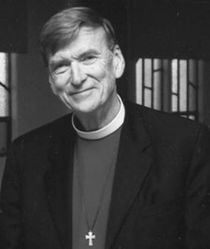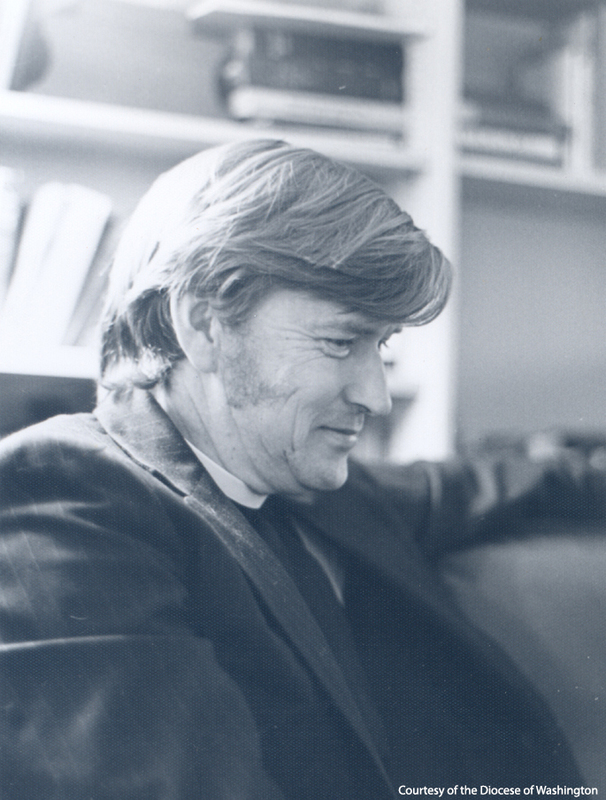Leadership Gallery
The Right Reverend John Shelby Spong, 1931-2021
And when the Civil Rights movement began in the United States it was clear to me that I had to identify with that movement, because it's a movement calling people out of the bondage of prejudice and into the fullness of humanity. I happen to believe that God's image is in every human being, and that every human being must treat it with ultimate respect, as I would treat somebody who is a very God presence to me. And the black people in America were the first people who made this very clear to me.
- John Shelby Spong
Born in Charlotte, North Carolina, Bishop Spong was educated in the public schools of Charlotte, was a Phi Beta Kappa graduate of the University of North Carolina in 1952 and received his Master of Divinity degree 3 years later from the Protestant Episcopal Theological Seminary in Virginia. He was ordained a deacon and priest in 1955.
After serving as rector of St. Joseph’s Church in Durham, North Carolina for two years, Spong became the rector of Calvary Church in Tarboro in 1957. Despite the ruling on Brown vs. the Board of Education three years prior to his arrival in Tarboro, the schools in the town were not integrated until 1964. Spong stressed to the white congregation the importance of abiding by the integration laws and urged his parishioners against the use of violence as he witnessed the town’s deep division on this matter. While serving at Calvary, Spong also ministered to the Black Episcopal congregation at St. Luke’s. Deemed as siding with the African American population, Spong was often ostracized and threatened as a result. Despite this, he did not give in to the pressure placed upon him. Spong has said of his work at St. Luke’s, “The small, Black faith community at St. Luke’s educated me in many ways. Its people also loved me, and by doing so helped to break open the residual racism of my childhood upbringing. The pastoral experiences I had there transformed my consciousness.”
From that time on, Spong would work tirelessly for civil rights and social justice. After serving as rector of two Virginia parishes, St. John’s Church, Lynchburg and St. Paul’s Church, Richmond for eleven years, he was consecrated Bishop of the Episcopal Diocese of Newark in 1976. He served in that capacity for 24 years. Spong was the senior active Episcopal bishop in the United States when he retired.
Promotional photograph of the Right Reverend John Shelby Spong for his book entitled This Hebrew Lord , 1974.
As a champion of other groups marginalized in the Church, he has sought full acceptance and participation of gays in the Church. In 1989 he ordained a non-celibate gay deacon to the priesthood, inciting both supporters and detractors. He credits his childhood in the South as the catalyst for his life’s work as he witnessed injustice, racism, sexism, and fundamentalism.
Spong has served on the Standing Commission on Human Affairs and Health and the House of Bishop’s Theology Committee. He served as a deputy to General Convention three times before becoming a bishop. He has been a trustee of the Episcopal Theological Seminary and St. Paul’s College as well has holding the position of president of the New Jersey Council of Churches. After retiring he lectured at Harvard University and Oxford University in the England. He was elected the Quatercentenary Scholar at Emmanuel College of Cambridge University.
Spong is well published and well-known for challenging commonly held doctrines. He is the author of eighteen books, including Why Christianity Must Change or Die; Here I Stand: My Struggle for a Christianity of Integrity, Love & Equality; Liberating the Gospels: Reading the Bible with Jewish Eyes; Resurrection: Myth or Reality?; Born of a Woman; Rescuing the Bible from Fundamentalism; Living in Sin? and This Hebrew Lord. His published articles now number in excess of one hundred.
Bishop Spong's personal papers are located at The Archives of the Episcopal Church. [Sources]



